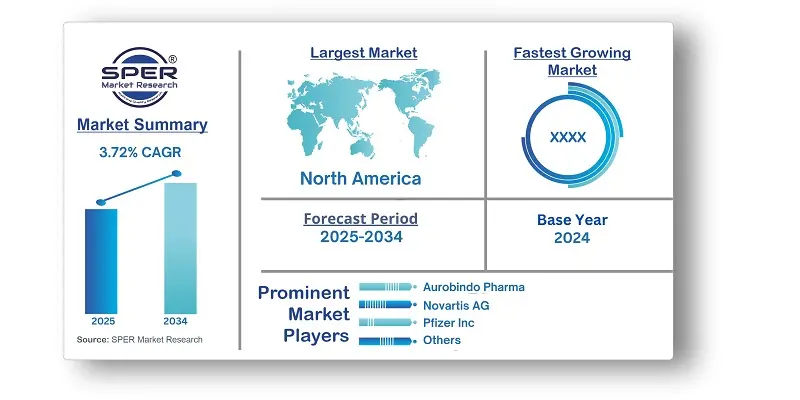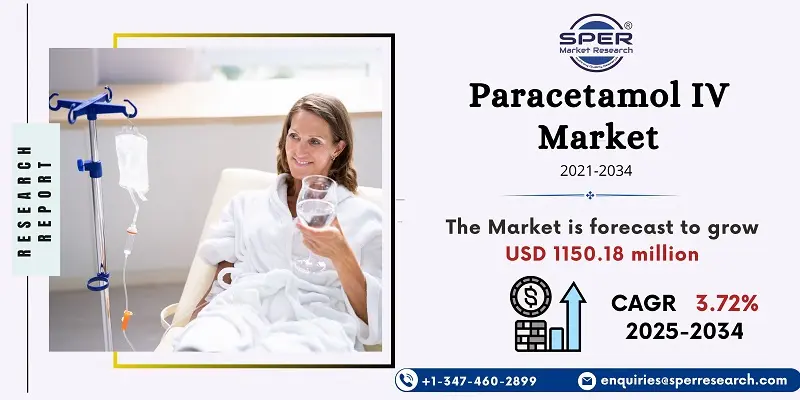
Paracetamol IV Market Growth, Trends, Size, Analysis, CAGR Status, Demand and Future Outlook
Paracetamol IV Market Growth, Size, Trends Analysis - By Indication, By Application, By End Use - Regional Outlook, Competitive Strategies and Segment Forecast to 2034
| Published: Feb-2025 | Report ID: HLCA2539 | Pages: 1 - 233 | Formats*: |
| Category : Healthcare | |||


- Hyloris Pharmaceuticals and Halex Istar signed a licensing and distribution deal for Maxigesic IV in Brazil in July 2024, expanding the availability of this non-opioid pain reliever in one of the biggest markets in South America. Maxigesic IV, which aims to assist combat the rising opioid use in Brazil, mixes ibuprofen and paracetamol for better post-operative pain treatment.
- Hyloris Pharmaceuticals SA (Euronext Brussels: HYL) and Salus Pharmaceuticals announced in January 2023 that they will work together to exclusively license and distribute Maxigesic IV throughout nine European nations. Launches are anticipated later in 2023 for this dual-action, non-opioid intravenous pain reliever, which combines ibuprofen and paracetamol. It is now registered in five of these markets. This partnership is in line with Hyloris's plan to repurpose current drugs and increase access to cutting-edge, non-opioid pain relief alternatives.
| Report Metric | Details |
| Market size available for years | 2021-2034 |
| Base year considered | 2024 |
| Forecast period | 2025-2034 |
| Segments covered | By Indication, By Application, By End Use. |
| Regions covered | North America, Latin America, Asia-Pacific, Europe, and Middle East & Africa. |
| Companies Covered | Abbott, Aurobindo Pharma, Bristol-Myers Squibb Company, Cipla Inc., Dr Reddy's Laboratories Ltd., Lupin, Mallinckrodt (Mallinckrodt Pharmaceuticals), Novartis AG, Pfizer Inc., Sanofi, Sun Pharmaceutical Industries Limited, and others. |
- Global Paracetamol IV Market Size (FY’2021-FY’2034)
- Overview of Global Paracetamol IV Market
- Segmentation of Global Paracetamol IV Market By Indication {(Pain, Pyrexia (Fever)}
- Segmentation of Global Paracetamol IV Market By Application (Surgical, Non-surgical)
- Segmentation of Global Paracetamol IV Market By End Use (Hospitals, Clinics, Others)
- Statistical Snap of Global Paracetamol IV Market
- Expansion Analysis of Global Paracetamol IV Market
- Problems and Obstacles in Global Paracetamol IV Market
- Competitive Landscape in the Global Paracetamol IV Market
- Details on Current Investment in Global Paracetamol IV Market
- Competitive Analysis of Global Paracetamol IV Market
- Prominent Players in the Global Paracetamol IV Market
- SWOT Analysis of Global Paracetamol IV Market
- Global Paracetamol IV Market Future Outlook and Projections (FY’2025-FY’2034)
- Recommendations from Analyst
1.1. Scope of the report1.2. Market segment analysis
2.1. Research data source
2.1.1. Secondary Data2.1.2. Primary Data2.1.3. SPERs internal database2.1.4. Premium insight from KOLs
2.2. Market size estimation
2.2.1. Top-down and Bottom-up approach
2.3. Data triangulation
4.1. Driver, Restraint, Opportunity and Challenges analysis
4.1.1. Drivers4.1.2. Restraints4.1.3. Opportunities4.1.4. Challenges
5.1. SWOT Analysis
5.1.1. Strengths5.1.2. Weaknesses5.1.3. Opportunities5.1.4. Threats
5.2. PESTEL Analysis
5.2.1. Political Landscape5.2.2. Economic Landscape5.2.3. Social Landscape5.2.4. Technological Landscape5.2.5. Environmental Landscape5.2.6. Legal Landscape
5.3. PORTERs Five Forces
5.3.1. Bargaining power of suppliers5.3.2. Bargaining power of buyers5.3.3. Threat of Substitute5.3.4. Threat of new entrant5.3.5. Competitive rivalry
5.4. Heat Map Analysis
6.1. Global Paracetamol IV Market Manufacturing Base Distribution, Sales Area, Product Type6.2. Mergers & Acquisitions, Partnerships, Product Launch, and Collaboration in Global Paracetamol IV Market
7.1. Pain7.2. Pyrexia (Fever)
8.1. Surgical8.2. Non-surgical
9.1. Hospitals9.2. Clinics9.3. Others
10.1. Global Paracetamol IV Market Size and Market Share
11.1. Asia-Pacific
11.1.1. Australia11.1.2. China11.1.3. India11.1.4. Japan11.1.5. South Korea
11.1.6. Rest of Asia-Pacific
11.2. Europe
11.2.1. France11.2.2. Germany11.2.3. Italy11.2.4. Spain11.2.5. United Kingdom11.2.6. Rest of Europe
11.3. Middle East and Africa
11.3.1. Kingdom of Saudi Arabia11.3.2. United Arab Emirates11.3.3. Qatar11.3.4. South Africa11.3.5. Egypt11.3.6. Morocco11.3.7. Nigeria
11.3.8. Rest of Middle-East and Africa
11.4. North America
11.4.1. Canada11.4.2. Mexico11.4.3. United States
11.5. Latin America
11.5.1. Argentina11.5.2. Brazil11.5.3. Rest of Latin America
12.1. Abbott
12.1.1. Company details12.1.2. Financial outlook12.1.3. Product summary12.1.4. Recent developments
12.2. Aurobindo Pharma
12.2.1. Company details12.2.2. Financial outlook12.2.3. Product summary12.2.4. Recent developments
12.3. Bristol-Myers Squibb Company
12.3.1. Company details12.3.2. Financial outlook12.3.3. Product summary12.3.4. Recent developments
12.4. Cipla Inc.
12.4.1. Company details12.4.2. Financial outlook12.4.3. Product summary12.4.4. Recent developments
12.5. Dr Reddy's Laboratories Ltd.
12.5.1. Company details12.5.2. Financial outlook12.5.3. Product summary12.5.4. Recent developments
12.6. Lupin
12.6.1. Company details12.6.2. Financial outlook12.6.3. Product summary12.6.4. Recent developments
12.7. Mallinckrodt (Mallinckrodt Pharmaceuticals)
12.7.1. Company details12.7.2. Financial outlook12.7.3. Product summary12.7.4. Recent developments
12.8. Novartis AG
12.8.1. Company details12.8.2. Financial outlook12.8.3. Product summary12.8.4. Recent developments
12.9. Pfizer Inc.
12.9.1. Company details12.9.2. Financial outlook12.9.3. Product summary12.9.4. Recent developments
12.10. Sanofi
12.10.1. Company details12.10.2. Financial outlook12.10.3. Product summary12.10.4. Recent developments
12.11. Sun Pharmaceutical Industries Limited
12.11.1. Company details12.11.2. Financial outlook12.11.3. Product summary12.11.4. Recent developments
12.12. Others
SPER Market Research’s methodology uses great emphasis on primary research to ensure that the market intelligence insights are up to date, reliable and accurate. Primary interviews are done with players involved in each phase of a supply chain to analyze the market forecasting. The secondary research method is used to help you fully understand how the future markets and the spending patterns look likes.
The report is based on in-depth qualitative and quantitative analysis of the Product Market. The quantitative analysis involves the application of various projection and sampling techniques. The qualitative analysis involves primary interviews, surveys, and vendor briefings. The data gathered as a result of these processes are validated through experts opinion. Our research methodology entails an ideal mixture of primary and secondary initiatives.



Frequently Asked Questions About This Report
PLACE AN ORDER
Year End Discount
Sample Report
Pre-Purchase Inquiry
NEED CUSTOMIZATION?
Request CustomizationCALL OR EMAIL US
100% Secure Payment






Related Reports
Our Global Clients
Our data-driven insights have influenced the strategy of 200+ reputed companies across the globe.




















